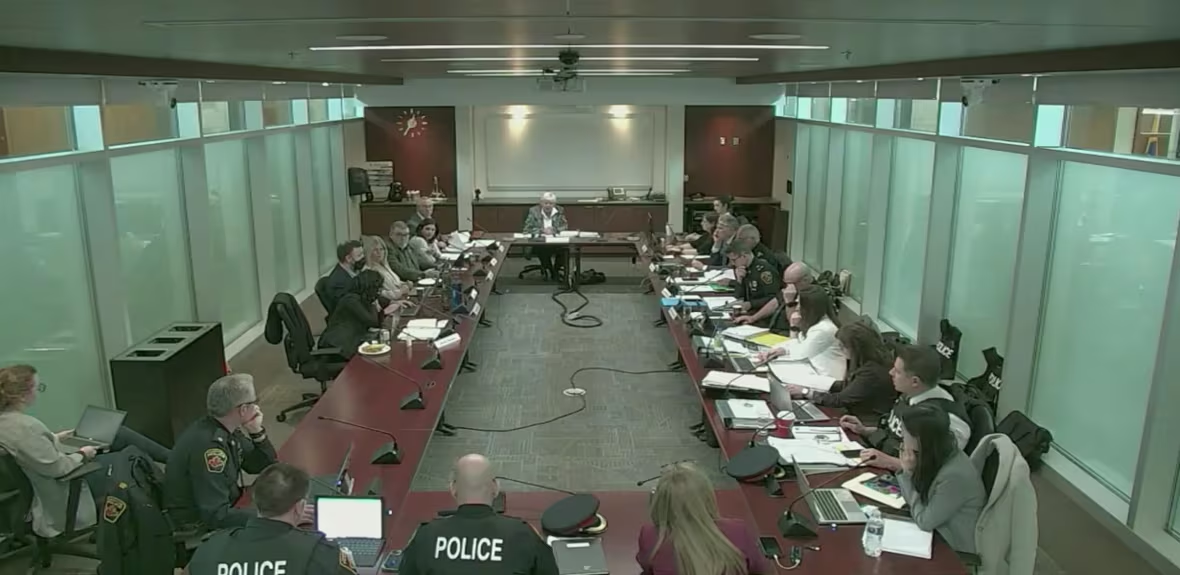Hamilton police board won't change its $214M budget ask, sends back to council for approval
Police board members voted, 5-2, in special meeting Tuesday to review spending

Hamilton's police board isn't making any changes to the $214.8 million proposed police services budget.
The decision was made at a special board meeting on Tuesday afternoon, after city councillors sent the police service's proposed budget for review in an attempt to trim the 2024 tax levy.
Police board members Dr. Anjali Menezes and Coun. Cameron Kroetsch put forward ways to find $5 million in savings but the other members voted down all of their motions.
Chair Pat Mandy, Vice-chair Fred Bennink, Mayor Andrea Horwath, Coun. Esther Pauls and board member Geordie Elms voted to support the proposed budget — a $16-million or 8.41 per cent increase over 2023 — and send it back to the city's general issues committee.
Pauls couldn't vote in past years due to her son being a senior officer with Hamilton Police Service but announced Tuesday morning the city's new integrity commissioner said there is no conflict of interest.
Policing accounts for 16 per cent of the average property tax bill — the largest component of the city's budget, Mike Zegarac, the city's general manager of finance, has said.
Board members vote down $5M in proposed savings
The tense, hour-long meeting took place in Room 216 inside City Hall.
The board initially restricted public access to the meeting, saying there wasn't enough space. It also delayed the meeting by a half hour to ensure the livestream was working.
The board received 136 written delegations about the budget in advance of its special meeting, a large majority of which supported a reduced budget.
Proposed savings from Kroetsch and Menezes included:
- Deferring hiring of 22 full-time staffers costing around $741,000, and reconsidering those hires in advance of next year's budget.
- Increasing the ratio of staff to management from about 11:1 "to be in line with other city emergency services like the Hamilton Fire Department" at 66:1 and the Hamilton Paramedic Service at 50:1.
- Disbanding units that aren't mandated by legislation or recommended by provincial inquests, such as the mounted unit ($914,068), the ceremonial units ($37,300) and sworn staff allocated to recruitment, and reallocating their staff.
- Removing expenses not mandated by legislation including advertising and promotion ($118,100).
- Cancelling spending on cable television ($19,600), retiree events ($19,400) and website design ($100,000), and repairing the Mountain Station parking lot ($500,000).
- Reducing office supplies spending to be in line with per capita spending on office supplies in other city departments.
- Eliminating separate policing surveys ($61,900) and working with the city on adding policing questions to its surveys, as well as investigating merging other teams with the city, including communications, legislative support, legal, accounting, information technology, and human resources.
In discussing the various proposed savings on Tuesday, the rest of the board members voiced their support for the budget and the police service.
Pauls said the proposed savings were "micro-managing" the budget and said spending on things like retiree events and office supplies were important.
Menezes noted how she can't afford cable television but the police service is spending $19,600 on it. She said expenses like that one are "nice to have" but aren't justified given the financial pressures residents are feeling.
Kroestch also said finding over a million dollar in savings shouldn't be considered micro-managing.

The mayor said it isn't the board's role to get into the operations of the service and felt "going into the details says we don't trust the people of the Hamilton Police Service."
"You can know the cost of everything and the value of nothing," Horwath said.
She said making comparisons between the police service's operation and the city's operation are "really dangerous."
Horwath later said there should be more collaboration between board members and members of the police service to better understand how money is spent.
Chair says police need more resources
After Kroetsch and Menezes' motions were voted down, Bennink submitted a late motion to keep the budget as is and send it back to the city.
His motion was allowed after a vote by the board. Menezes and Kroetsch were the only two to vote against it.
Menezes and Kroetsch said the board was giving Bennink preferential treatment and pointed to how the board wouldn't allow Menezes to submit a late motion at a prior last board meeting.
"It hurts," Menezes said.

Board Chair Pat Mandy said she supported the proposed budget and said she thinks the police service needs more resources.
Earlier in the meeting, she also suggested Kroetsch may have a conflict of interest with his participation in the meeting because he was the councillor who moved the motion to send the budget back to the board for review. No other board member voiced support for her concern, however.
Menezes questioned the review process, asking why residents were encouraged to submit written feedback if board members weren't going to act on what they received.
Kroetsch said it was a "sad day" and highlighted how no other board members made any attempt to change the budget or suggest alternatives.
"No one else here bothered to put a single cent on the table," Kroetsch said.
The police funding will now be considered by council on Thursday, when it is expected to vote on the 2024 city budget.
City staff have proposed an overall 7.9 per cent increase, which equals about $380 more in property tax for the average residential home assessed at $385,000 based on 2016 values.
With files from Saira Peesker, Justin Chandler and Samantha Beattie

